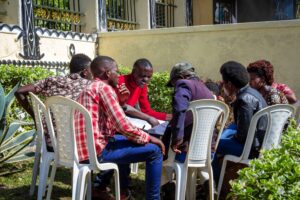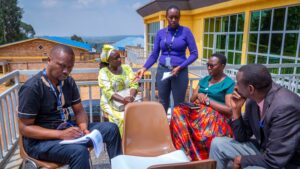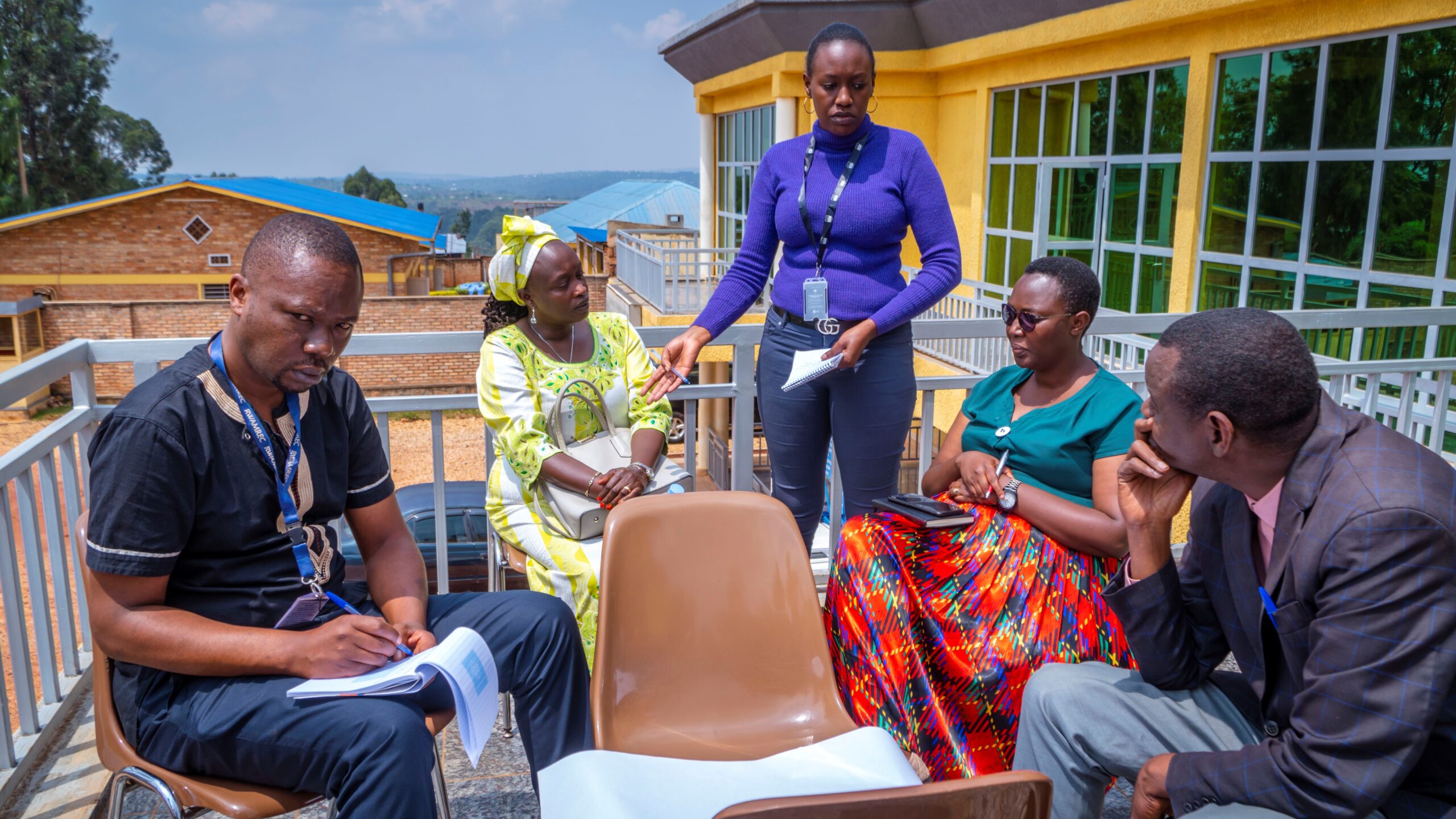Nearly 70% of the Rwandan population is made up of youth and it is essential for their voices to be heard in decision-making processes at all levels, to ensure that government policies and programs reflect their needs and priorities.
GoR’s Legal and statutory framework
GoR’s commitment and efforts to increase youth participation in governance are clearly defined in the existing legal and political framework. Specifically, Article 27 of the 2003 constitution of the Republic of Rwanda as revised in 2015 provides that every citizen, youth inclusive, has the right to participate in the development processes of their country (Government of Rwanda (GoR), 2015).
In addition, the constitution allots a special seat to the youth in the parliament. There is also the Ministry of Youth and Culture, a fully functioning National Youth Council, proclaimed by the Constitution in article 139 (3°(b), with committee structures from the national, down to the village level. Article 75 (3°) of the Constitution allocates two (2) Deputies in Rwanda’s parliament to be elected by the National Youth Council (NYC).
Furthermore, the Government of Rwanda (GoR) also adopted a National Youth Policy. The policy is deliberate on youth participation, and it provides the required policy framework and orientation for the mobilisation, participation, and integration of the youth in all aspects of Rwanda’s development.
Additionally, the new National Decentralisation policy (2021), which was initially adopted in 2000 intends to deepen and sustain citizen-centered governance and promote equitable local development for socio-economic transformation. Similarly, the National Strategy for Transformation (NST1) under the transformation governance pillar priority area six calls for increased citizen participation with a particular focus on the youth to participate in planning for development (Government of Rwanda (GoR), 2017). Furthermore, the government has established different direct citizen participation platforms including among others Inteko z’abaturage and Umuganda in which the youth have an equal right to participate.

Challenges in youth participation
Despite the commitments and progress, youth participation is still limited. For example, the Citizen report Card (published by RGB in 2021) indicates that only 55.4% of the citizens are satisfied with their participation in the elaboration of district budgets and plans and 68.8% for their participation in Imihigo planning. The same report highlighted that only 29% and 14.9% of citizens are aware of the functionalities of Sector and District Advisory councils (Njyanama) respectively.
In the same framework, other studies reported insufficient youth participation due to many factors including the limited capacities and confidence of youth to engage in decision-making processes. The results of recent studies on youth participation in local governance processes conducted by Never Again Rwanda (2019, 2018 and 2016) deduced that youth do not optimally participate in local governance processes, and that their voice is still marginally heard, despite the many mechanisms and supportive policy in addition to the regulatory frameworks put in place to catalyse youth active participation.
A study conducted by Never Again Rwanda (2018) on factors contributing to low citizen participation in local government imihigo process concluded, among others, that District imihigo that is allocated public budget is generally not responsive to youth needs and priorities. It also pointed out to youth (representatives) being mainly used by local authorities to mobilise their fellows towards the execution of government policies and programs but rarely to shape them.
“In many cases, we are told to implement projects such as the construction of a cell office, schools, and roads and we are even requested to make a contribution in cash or in kind but in most cases, we are not part of the design and planning processes” (FGD, Citizens, Huye).
Another serious challenge hindering youth participation is the fact that while multiple citizen consultations mechanisms such as Inteko z’Abaturage, Umuganda, Umugoroba w’Umuryango, and others, some youths do not fully utilise these available spaces to engage local leaders on their concerns and priorities due to limited policy literacy, capacity, and confidence to hold their leaders accountable. Other factors include youth unemployment, limited trust between youth and older people, also that some mechanisms and approaches used by local leaders to engage youth are not youth friendly, among others.
In addition, evidence from the field-level practice also indicate that youth lack confidence and voice power necessary for them to optimally leverage the potential of those existing consultation platforms and vibrantly engage with government policy processes on matters impacting their lives. Some youth leaders are still reluctant to advocate for their constituents. They avoid doing advocacy initiatives or holding local leaders accountable to avoid conflicts with the leaders. For instance, cases where youth who attempted to do advocacy and/or raise issues of corruption among local leaders, were as a result prevented from accessing some services at local level.
The baseline survey conducted in 2022 by Never Again Rwanda for its Dufatanye Kwiyubakira Igihugu Program (DKI) in Kayonza, Nyagatare, Musanze, Burera, Nyanza, Huye, Ngororero and Rusizi districts, indicated that only 60% of surveyed youth (499) reported confidence to participate in citizen engagement meetings at local level and (39.9%) reported confidence to share ideas and priorities during these meetings.
Youth leaders and youth representatives still lack capacities to analyse issues affecting youth, or to effectively communicate them to local leaders. Specifically, young people lack literacy on new and existing government policies and programs, knowledge and understanding of where major government decisions are made (government decision-making machinery), who makes them (power relationships), their weight (hierarchy of decisions), and when they are likely to be made (key moments of decision-making). In this regard, the same baseline study recorded only 27.3% aware of local governance and decision-making machinery, 26.0% aware of the functionalities of existing local citizens consultations structures, 32.4% aware of their rights, roles and responsibilities in local decision-making processes, and 28.3% aware of public policies of high interest to youth.
Similarly, the baseline survey conducted by Never Again Rwanda in 2021 for Youth Engage “Ijwi Ryubaka” in Gisagara, Huye, Nyamagabe, Ngororero and Rusizi districts showed a limited proportion of youth (51.7%) who are aware of existing specialised platforms /spaces for youth consultations and inputs in policy and decision making. The same baseline demonstrated limited capacities and confidence among youth and youth leaders to demand for accountability. Specifically, only 58.2% of interviewed youth reported comfort to hold local leaders accountable on what is not going well in villages and/or cells, especially the programs aimed to address youth’s needs and priorities.
In addition, the level of comfort among youth to openly ask local leaders how the budget allocated to youth development projects has been used was very low with an average of 38.5%. Again, only 51.5% of interviewed youth agreed that youth leaders /representatives at cell and or sector level provide timely feedback on how issues of youth have been addressed. Finally, only (42.8%) youth prefer to use citizen assemblies as their most preferred consultative and feedback mechanisms which is one of the factors why youth participation in citizen assemblies is limited.
Our efforts in youth engagement
To contribute to addressing the above highlighted knowledge and capacity gap, Never Again Rwanda revamped the “Youth Engagement pillar” in its Strategic Plan (2021-2025) dedicated to nurturing capacity and confidence among youth of various categories to be able to participate in local governance and decision-making processes. Through the pillar, NAR’s goal is for decisions and policy making to be driven by youth needs, priorities, and innovations. NAR provides youth with critical thinking skills, human rights education, peace education, support youth-initiated projects, create safe spaces for dialogue, facilitate intergenerational dialogue, engage youth in democratic processes and avail tools for youth engagement and empowerment.
Specifically, under its various programs such as Dufatanye Kwiyubakira Igihugu, Youth engage and Youth Lab, NAR is providing youth leaders, especially the newly elected youth representatives with policy literacy through trainings on leadership, human rights, critical thinking, civic participation, governance, gender, basic policy analysis and advocacy. The objective of these trainings is to increase youth leadership skills and confidence for them to actively engage in governance and decision-making, strengthen their advocacy and communication skills and subsequently influence local decisions through existing consultation platforms.
The impact
Since January 2021, NAR has trained more than 800 youth leaders and youth representatives from Huye, Gisagara, Nyanza, Nyamagabe, Ngororero, Rusizi, Musanze, Burera, Nyagatare and Kayonza. In addition, 45% of its beneficiaries in the same period are youth (5,974 youth including 2,893 females and 3,081 males) who were engaged in different activities across all programs.
Through different capacity building sessions, youth leaders were educated on existing citizen participation structures and how they can use their potential to maximize their participation to voice their needs and concerns. They have equally been educated on systematic identification of youth issues, structuring and analysis as well as how to effectively advocate for youth priorities at different levels. The trainings were viewed as very productive by youth leaders and engaged local leaders. For example, majority of the trained youth leaders acknowledge that it is the first training of its kind since elected and committed to apply the knowledge in their daily work as youth representatives.
Youth leaders demonstrated increased confidence to engage their peers, consult them and provide them with feedback. They have equally demonstrated a good level of comfort to engage local leaders on issues and priorities for youth. The supported youth leaders were able to set a practical example for both local leaders and citizens for a genuine and inclusive consultation.
“I used to think that my role is only mobilizing youth to implement community activities such as Umuganda, but from this training, I have realized that my first role is rather advocacating for youth needs and priorities. I really appreciate the training especially critical thinking session, I will use the skills to work with my fellow youth to collectively identify, analyze youth needs and challenges to inform our advocacy efforts” A female youth leader, Nyanza district
“I used to witness human rights violations in my sector, which in some cases were committed by local leaders, however I could not report that. From now on, I feel confident to stand against human rights violations”. A male youth leader in Rusizi.
Also, in some dialogue and discussions, youth leaders confidently challenged local leaders and held them accountable on several issues including injustices, poor service delivery and corruptions that hamper effective youth participation.
An example is one youth in Musanze who openly challenged the vice mayor about a rehabilitation project they had worked on; where the district had pledged to supply bicycles (taxi Velo) to a former drug addicts youth group “Hinduka uhindure Abandi” but for years the district had not yet fulfilled the commitment. After the discussion, the Vice Mayor in charge of Economic development promised to follow it up and give him feedback as soon as possible.
In one of the roundtable discussions, the youth in Nyagatare openly raised issues to the Vice-mayor who was present in the dialogue. Among the challenges highlighted include lack of a playground to facilitate sports among youth, lack and expensive prosthetic devices for people with disability and youth unemployment among others. The vice mayor committed to bring the issues to the district committee for further discussions. With above examples, the roundtable discussions provided spaces for youth consultations and/or a feedback mechanism between youth and local leaders.
This is the trend that was seen in most of the trainings, roundtable dialogues and consultative feedback sessions. The local leaders committed to support the trained youth leaders in addition to closely working with them to understand youth needs and challenges to consequently inform their decision-making processes. The mayor in charge of social affairs in Nyanza district appreciated NAR’s support in building the capacities of youth leaders including the newly elected youth leaders.
“The district is happy for Never Again Rwanda as a partner in promoting good governance. We appreciate the support for building the capacities of the youth leaders. We are proud that the trained youth will be able to deliver on their responsibilities. Moving forward, we will start engaging the trained youth leaders to co-facilitate the citizens assemblies and other consultative platforms to facilitate them practicing the acquired skills and ensure youth ownership of these mechanisms” Vice Mayor, Nyanza District.
The trained youth demonstrated increased understanding of their roles and responsibilities as active citizens, human rights, and how they can use the acquired skills to advocate for their rights and for the marginalised groups.
The trained youth leaders have so far started to amplify the collection and analysis of youth needs and priorities, engaging relevant local leaders in dialogues with youth to critically identify solutions to the highlighted challenges. Some have even started co-facilitating with local leaders to organize citizens consultations dialogues especially those intended for youth. In addition, trained youth leaders increased their engagement with peers on different human rights issues and jointly identified mitigation strategies.
The trained youth leaders in Nyagatare district started campaigns against the persistent issues – drug abuse and teenage pregnancies. The sector leaders appreciated their initiatives and committed to support them.
“We are cognizant of the youth contribution in the development of our country. These issues of drug abuse and teenage pregnancies need the involvement of everyone, and we are counting on you. The sector is ready to work with you to address this issue”. Tabagwe Sector Executive Secretary, Nyagatare
Other trained youth leaders have conducted awareness campaigns on dire issues like malnutrition, unemployment, school dropout, among others, different platforms like through Inteko z’Abaturage. This also promoted local leaders to make commitments to make changes and address the issues highlighted.

Our commitment
To sustain such results, NAR is committed to continue providing capacity building to various categories of youth to increase their confidence, provide them with space for dialogue and facilitate accountability at local level. NAR will also continue to identify and support relevant youth initiatives meant to increase their understanding of human rights, policy literacy and citizen engagements in local decisions-making processes.
By Celestin Ngengiyumva


